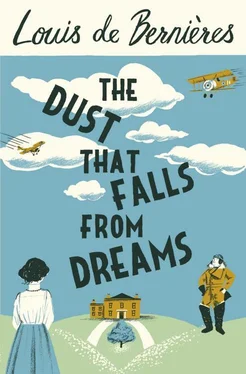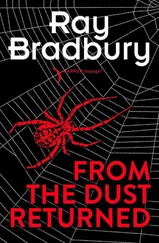Rosie knew what convention required. Before you married you destroyed all your love letters from everyone else. That’s what you had to do, and it made some symbolic sense; it was how you signified that there was now, irrevocably, only one man in your life. It was like the commitment you made when you changed your name.
She had a thick sheaf of Ash’s letters, from 1910 to 1915, bound up in a ribbon, and she kept them in her dressing-table drawer, right at the back, behind the powder puffs and compacts, and the cotton wool. They had acquired the feminine smell of cosmetics and scent, and there was no longer any point in sniffing at them. She took them out often and reread them. Their passionate hyperbole never failed to fill her with longing and regret. In those days every month had seemed to be July.
One Sunday after matins she was whiling the time away before lunch when she suddenly found a politician’s solution to her dilemma, and accordingly she went out on Monday and bought a small ruled notebook from the stationer’s. It was bound in red-and-black leather, and had a ribbon that served as a bookmark. She calculated that it should be exactly the right size if only she edited out the chit-chat and unnecessary detail, and just retained all that was most beautiful and moving. Sitting at the escritoire in her room, with a photograph of Ash propped up at the back of it, she wrote on the first page ‘ The past is part and parcel of the present ’ and then she began to redact.
‘ You are now a part of me — I hold and cherish you as a thing sacred. ’
‘ Dearest, dearest heart, my soul calls to yours and I feel worn out. ’
‘ To me you are holy and I sometimes wonder if Heaven is better than your dear kisses. ’
‘ My thoughts are my visionary arms. They cling to you always. ’
‘ Last night I dreamed that you came to me and kissed me, and said “I have come to stay with you tonight” — why is Heaven so cruel? Just as I was about to cling to you I was awakened .’
‘ I sit all alone from 8.30 to 10.30 thinking of you — these hours are the most sacred in the day, beloved. ’
‘ When you smile on me again the curtains will be drawn from the sun. ’
‘ I want to be alone in sunlit fields and feel your dear head against mine until the end of all things. ’
‘ I would work and give my life’s blood to win you, my beloved. I know I am not worth considering, but I love, want and must have you. I crave for you all day, and sometimes find myself not listening to people, but hearing your voice calling me. ’
‘ During the evening will you give yourself to me for just one second? All things earthly and heavenly are outshone by you. ’
‘ My prayer tonight is: God, You can take away all that I have, but give me a garden of flowers with my sweet one, for us to live in. ’
‘ All I want is a kiss from your lips to fire my blood. ’
‘You know, dearest heart, how an autumn morning can make your blood tingle. Well, that’s what happens when I think of those kisses I shall steal from you. ’
‘ You will probably never appreciate or understand the gaps you have filled in my life. I was so very lonely before you came. You seemed to understand at once how desolate this country seemed to me, how I struggled with its rigid ways, even as a little boy, and how I couldn’t understand its archaic institutions, how I felt so much like a bird forbidden to fly, how I longed to go home to America. It was you who gave me England, made England my home. Thank you for giving me England. Flower of my Eden, goodnight. ’
On the eve of her wedding to Daniel, having copied out all that was most intimate in Ash’s letters, when the rest of the house was all afluster with preparations and jollity, Rosie set about doing what she had resolved to do. She arranged balls of newspaper in her grate, adorned them with kindling, and placed lumps of coal strategically. She took the box of matches from the mantelpiece, and found that they were damp. The head of the first match simply came off, and the second broke, but the third one caught, and she tilted it to make the flame climb. Carefully she set light to as many balls of paper as she could. She laid the letters reverently on top.
With horrible detachment she began to watch as Ash’s messages burned, the beloved handwriting turning brown and then flaring.
Suddenly she knew that she couldn’t bear it. She saw the fire taking, and had the wild thought that if only she acted fast enough her fingers would escape the flames. Her hands darted in, and seized one letter after another, dropping them on the hearth and beating out the flames. She felt the sting and sear of it, but knew that it was too late to stop trying to rescue the letters.
Once all the charred paper was on the hearth, she realised that she had burned the backs of her hands as well as the palms and fingers. As the horrifying pain welled up and the skin blistered, she knew there was nothing she could do but run for the bathroom.
Her hands were too damaged to grip the knob. She kicked furiously at the door and began to wail and moan, waving her hands in the attempt to cool them with currents of air.
It seemed like an age, but it was moments before Millicent opened the door, and Rosie rushed past her, falling headlong on the landing, and unable to use her hands to save herself, she crashed down on her face and elbows. Sobbing, she scrambled to her feet and ran. Millicent ran in her wake. Once in the bathroom, Rosie cried, ‘Turn on the tap, turn on the tap! Quick, Millie, quick!’
As Rosie stood there with cold water running over her burns, crying with the agony of it, Millicent hurtled downstairs and, on her own initiative, ran out of the front door without her hat and down Court Road to fetch Dr Scott.
Later that evening the entire family held court in the drawing room whilst the two servants hovered in the hall. Rosie was their favourite of the sisters, and they were overcome with anxiety and confusion. Rosie had resisted being taken to hospital, and had duly succumbed to shock. She had lain on the sofa, pale and with almost no pulse at the wrist, cold sweat pearling on her brow. She neither moved nor seemed to breathe, and the family were appalled by the prospect of her dying the night before her marriage. Hamilton McCosh went up to her room, inspected the charred letters, and immediately understood what had happened. When he returned and informed the others, they all had the same thought. Ottilie said, ‘The wedding’s got to be called off. Sophie, you and Fairhead will just have to go ahead and get married on your own.’
Dr Scott, a portly middle-aged man of great experience and considerable natural wisdom, arranged Rosie so that her feet were above her head, in order to increase the flow of blood to the brain. ‘It’s more important to treat the shock than the burns,’ he told the family. ‘The burns can wait, and they aren’t nearly as bad as they look. Kindly ask one of the servants to fetch a large bowl or bucket. The other must fetch blankets, and make as many hot-water bottles as you have in the house. Otherwise I must ask you to remain calm and not to interfere.’
Mrs McCosh bridled, not because she wanted to interfere, but because she felt it was something to which she had the natural right.
Just as Dr Scott had hoped and anticipated, Rosie woke up and was promptly sick into the bowl that he had requested. ‘Excellent!’ exclaimed the doctor. ‘Now we can be certain she’ll live. A pot of weak tea please!’
Dr Scott set about preparing the wounds for dressing. The split in her lip he did nothing about. He made sure that no charred paper still adhered to the wounds on her hands, and cleaned them very gently with warm water. Rosie winced and whimpered, and Sophie went behind her and put an arm round her shoulder, placing her head side by side with Rosie’s. ‘Be most heroical and valorifical and undauntical,’ she whispered, and Rosie managed to laugh.
Читать дальше












